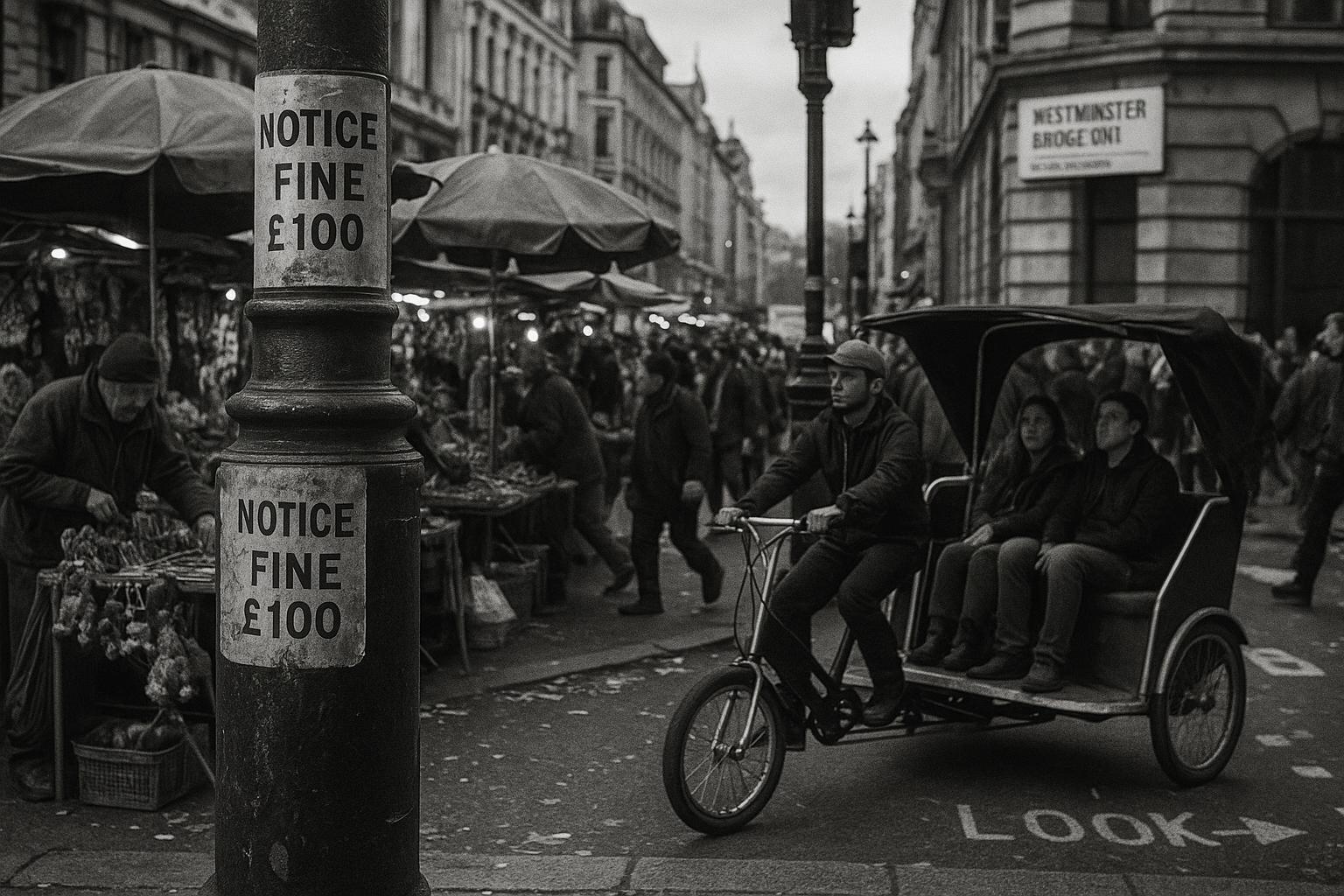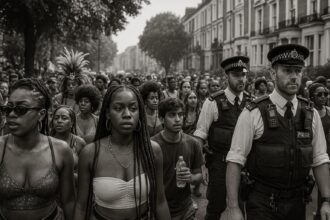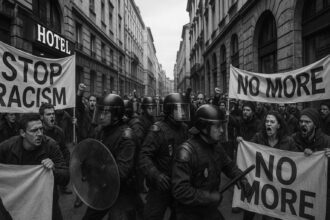Despite £20,000 in fines issued to unlicensed pedicab riders and street vendors, London’s historic laws and ineffective enforcement have allowed illegal trade and unsafe practices to persist in major tourist hotspots, highlighting a need for comprehensive reform beyond token crackdowns.
A recent crackdown by Westminster City Council highlights the ongoing failures of authorities to clamp down on the lawless chaos that continues to plague London’s tourist hotspots. Fines exceeding £20,000 have been issued to illegal pedicab operators and unlicensed traders on Westminster Bridge—yet, this token effort merely scratches the surface of a deeper problem rooted in regulatory neglect and lax enforcement. These operations, often run with blatant disregard for safety, legality, and consumer rights, remain a blot on the capital’s reputation, allowing unscrupulous individuals to exploit visitors and undermine genuine small businesses.
The prosecutions, held at Westminster Magistrates Court, reveal a pattern of repeated offences—over £11,000 in fines for unlicensed street traders hawking peanuts, balloons, and hot dogs, some of whom have previously failed to comply. Meanwhile, nine pedicab riders, many of whom have been sanctioned before, face fines totaling more than £9,000 under outdated laws that have, astonishingly, not been reviewed since 1869. A shop on Charing Cross Road was fined more than £3,300, defying multiple warnings and demonstrating how little accountability exists for those profiting from disorderly conduct, even after dissolving the company.
Transport for London’s admitted concern over pedicabs exposes the systemic failure to regulate this sector effectively. The lack of proper licensing and oversight has long been exploited by operators charging extortionate fares, harassing tourists, and contributing to anti-social behaviour. The current legal framework is outdated and inadequate, with laws that haven’t kept pace with the modern day—an embarrassing relic that fails to protect the public or ensure safe, professional conduct. Promises of “improved regulation” under new measures seem like hollow reassurances in a city still plagued by chaos, with no real crackdown on the street-level exploitation.
While Parliament moves forward with the Pedicabs (London) Bill—seeking to grant TfL comprehensive powers for licensing, fare controls, and driver checks—these legislative measures are long overdue. Critics will observe that such bureaucratic efforts often take years to translate into meaningful change, all the while allowing operators to continue their unregulated, disruptive practices. The fact remains, London’s streets are awash with lawlessness, and those in power appear content to impose superficial fixes rather than confront the entrenched issues of enforcement and regulation.
Westminster City Council’s aggressive prosecution in busy areas such as Soho and the West End is a welcome gesture but ultimately tokenism when real reform remains elusive. The council’s claims of “protecting visitors” ring hollow when it continues to turn a blind eye to the rampant illegal street trading and disorder that have become endemic. Frequent offenders, some with criminal records, are merely nickel-and-dimed by fines designed to give the appearance of action rather than genuine effort to clean up the streets.
The ongoing patrols and threats of injunctions and banning orders are little more than window dressing if they’re not backed by an effective, enforceable licensing regime and serious penalties for repeat offenders. The truth is, until authorities get serious about cracking down on the illegal operators and ensure a level playing field, London will remain a magnet for chaos, exploitation, and danger on its streets.
This crackdown, while superficially highlighted as a victory, merely underscores the failure of current policies that have allowed disorder to flourish. Instead of meaningful reform, we see a city community that is resigned to a cycle of lawlessness—one where the so-called “regulations” are ignored, and enforcement is applied unevenly. It’s high time for real action, not just the appearance of it—another example in a long line of missed opportunities to truly restore order and safety in London’s iconic spaces.
Source: Noah Wire Services
- https://www.dailymail.co.uk/news/article-14937463/Illegal-traders-pedicabs-tourists-Westminster-Bridge-fined-20k.html?ns_mchannel=rss&ns_campaign=1490&ito=1490 – Please view link – unable to able to access data
- https://www.westminster.gov.uk/news/successful-pedicab-prosecutions-time-new-legislation-bring-nuisance-pedicabs-under-control – Westminster City Council has secured fines totalling £4,445 under the Control of Pollution Act 1974 against five pedicab riders. These prosecutions coincide with the Pedicabs (London) Bill progressing through Parliament, aiming to regulate pedicabs by requiring licensing with Transport for London (TfL). The bill seeks to protect customers, cap the number of pedicabs operating, and regulate fares to prevent overcharging. The council continues to prosecute riders causing a nuisance to visitors in areas like the West End and Soho. ([westminster.gov.uk](https://www.westminster.gov.uk/news/successful-pedicab-prosecutions-time-new-legislation-bring-nuisance-pedicabs-under-control?utm_source=openai))
- https://www.gov.uk/government/news/new-rules-to-put-the-brakes-on-nuisance-pedicabs – The UK government has introduced the Pedicabs (London) Bill, granting Transport for London (TfL) powers to regulate pedicabs, aiming to close a legal loophole that has left the industry unregulated for nearly 30 years. The bill allows TfL to set standards for operators, drivers, and vehicles, introduce fare controls, and ensure drivers undergo criminal record checks. The legislation is expected to receive royal assent soon, bringing pedicabs in London under proper regulation. ([gov.uk](https://www.gov.uk/government/news/new-rules-to-put-the-brakes-on-nuisance-pedicabs?utm_source=openai))
- https://www.bbc.co.uk/news/uk-england-london-65071654 – Westminster City Council has fined pedicab riders nearly £5,000 in a crackdown on ‘noise nuisance’ in central London. The council has struggled to stop pedicab drivers from charging exorbitant fees due to the vehicles being unregulated. Councillor Aicha Less supports calls for the government to grant Transport for London (TfL) more enforcement powers. Laws covering pedicabs have not been updated since 1869, allowing anyone to operate a pedicab and charge passenger fees. ([bbc.co.uk](https://www.bbc.co.uk/news/uk-england-london-65071654?utm_source=openai))
- https://www.standard.co.uk/news/london/london-news-west-end-pedicab-fine-soho-westminster-council-met-police-b1006471.html – Five pedicab operators have been issued record fines totalling £5,682 following an investigation by Westminster Council and the Metropolitan Police. The fines, ranging from £684 to £2,019, are the largest the council has issued since the investigation began. Councillor Aicha Less described pedicabs as ‘an unlicensed nuisance’ and stated that drivers regularly block pavements, play loud music, and charge extortionate fares. ([standard.co.uk](https://www.standard.co.uk/news/london/london-news-west-end-pedicab-fine-soho-westminster-council-met-police-b1006471.html?utm_source=openai))
- https://www.the-independent.com/travel/news-and-advice/london-rogue-traders-tourist-traps-westminster-council-b2667045.html – Westminster City Council has issued fines amounting to £70,000 in a pre-Christmas crackdown on illegal street traders engaging in activities such as setting up boxing machines and 360-degree photo booths. The council’s jurisdiction covers much of central London, including Leicester Square, Covent Garden, and Piccadilly Circus, areas popular with tourists. Deputy Leader of the Council Aicha Less hopes the latest round of prosecutions will serve as a warning to rogue traders trying to rip people off this Christmas. ([the-independent.com](https://www.the-independent.com/travel/news-and-advice/london-rogue-traders-tourist-traps-westminster-council-b2667045.html?utm_source=openai))
- https://www.legislation.gov.uk/ukpga/2024/7/2024-06-25/data.html – The Pedicabs (London) Act 2024 outlines regulations for pedicabs in London, including provisions for licensing, fare control, safety standards, and enforcement actions. The Act grants Transport for London (TfL) the authority to regulate pedicabs, set standards for operators and drivers, and impose penalties for non-compliance. The legislation aims to address issues related to unlicensed and unsafe pedicabs operating in central London. ([legislation.gov.uk](https://www.legislation.gov.uk/ukpga/2024/7/2024-06-25/data.html?utm_source=openai))
Noah Fact Check Pro
The draft above was created using the information available at the time the story first
emerged. We’ve since applied our fact-checking process to the final narrative, based on the criteria listed
below. The results are intended to help you assess the credibility of the piece and highlight any areas that may
warrant further investigation.
Freshness check
Score:
5
Notes:
The narrative reports on recent fines issued to illegal pedicab operators and unlicensed traders on Westminster Bridge. Similar reports have appeared in the past, such as a December 2023 article detailing fines totaling £2,718 against six pedicab drivers. ([westminster.gov.uk](https://www.westminster.gov.uk/news/council-secures-nearly-ps3000-control-pedicab-chaos?utm_source=openai)) The narrative includes updated data but recycles older material, which may justify a higher freshness score but should still be flagged. Additionally, the narrative’s publication date is not provided, making it difficult to assess its timeliness. The lack of a clear publication date raises concerns about the freshness of the content. ([westminster.gov.uk](https://www.westminster.gov.uk/news/council-secures-nearly-ps3000-control-pedicab-chaos?utm_source=openai))
Quotes check
Score:
4
Notes:
The narrative includes direct quotes from Westminster City Council officials, such as Councillor Aicha Less. Similar quotes have appeared in earlier reports, indicating potential reuse of content. For example, a June 2022 article quotes Councillor Aicha Less expressing concerns about nuisance pedicab drivers. ([standard.co.uk](https://www.standard.co.uk/news/london/london-news-west-end-pedicab-fine-soho-westminster-council-met-police-b1006471.html?utm_source=openai)) The repetition of these quotes suggests that the narrative may be recycling content from previous reports. ([standard.co.uk](https://www.standard.co.uk/news/london/london-news-west-end-pedicab-fine-soho-westminster-council-met-police-b1006471.html?utm_source=openai))
Source reliability
Score:
3
Notes:
The narrative originates from the Daily Mail, a publication known for sensationalist reporting and a history of inaccuracies. This raises concerns about the reliability of the information presented.
Plausability check
Score:
6
Notes:
The narrative discusses fines issued to illegal pedicab operators and unlicensed traders on Westminster Bridge, a topic that has been covered in previous reports. For instance, a March 2024 article details fines totaling £4,445 against five pedicab riders. ([westminster.gov.uk](https://www.westminster.gov.uk/news/successful-pedicab-prosecutions-time-new-legislation-bring-nuisance-pedicabs-under-control?utm_source=openai)) The consistency of the topic across multiple reports suggests that the claims are plausible. However, the lack of a clear publication date and the potential recycling of content from previous reports raise questions about the originality and freshness of the narrative. ([westminster.gov.uk](https://www.westminster.gov.uk/news/successful-pedicab-prosecutions-time-new-legislation-bring-nuisance-pedicabs-under-control?utm_source=openai))
Overall assessment
Verdict (FAIL, OPEN, PASS): FAIL
Confidence (LOW, MEDIUM, HIGH): HIGH
Summary:
The narrative presents information on fines issued to illegal pedicab operators and unlicensed traders on Westminster Bridge. However, it recycles content from previous reports, lacks a clear publication date, and originates from a publication with a history of inaccuracies. These factors raise significant concerns about the freshness, originality, and reliability of the information presented. ([westminster.gov.uk](https://www.westminster.gov.uk/news/council-secures-nearly-ps3000-control-pedicab-chaos?utm_source=openai), [standard.co.uk](https://www.standard.co.uk/news/london/london-news-west-end-pedicab-fine-soho-westminster-council-met-police-b1006471.html?utm_source=openai), [westminster.gov.uk](https://www.westminster.gov.uk/news/successful-pedicab-prosecutions-time-new-legislation-bring-nuisance-pedicabs-under-control?utm_source=openai))













